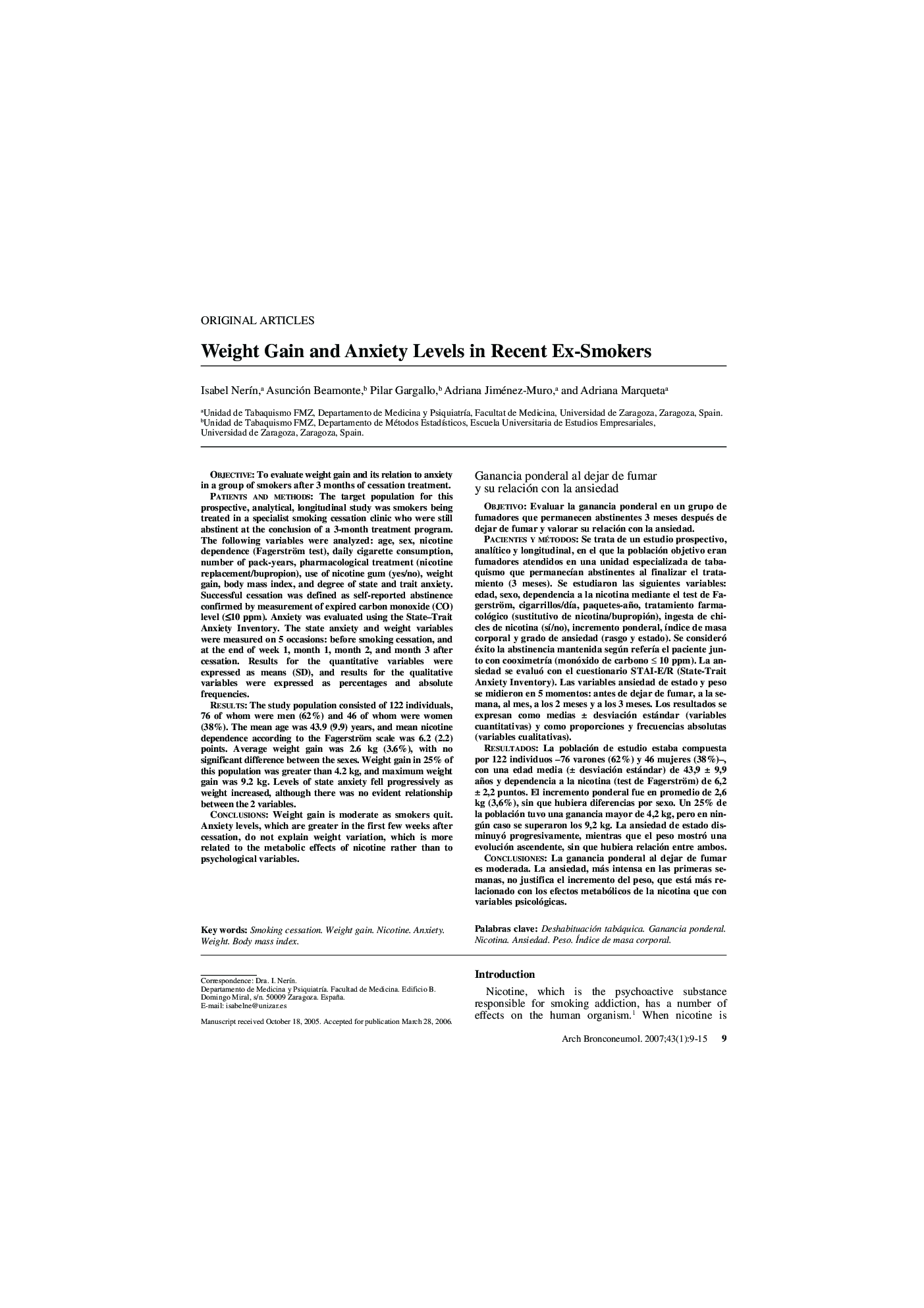| Article ID | Journal | Published Year | Pages | File Type |
|---|---|---|---|---|
| 4206906 | Archivos de Bronconeumología (English Edition) | 2007 | 7 Pages |
ObjectiveTo evaluate weight gain and its relation to anxiety in a group of smokers after 3 months of cessation treatment.Patients and methodsThe target population for this prospective, analytical, longitudinal study was smokers being treated in a specialist smoking cessation clinic who were still abstinent at the conclusion of a 3-month treatment program. The following variables were analyzed: age, sex, nicotine dependence (Fagerström test), daily cigarette consumption, number of pack-years, pharmacological treatment (nicotine replacement/bupropion), use of nicotine gum (yes/no), weight gain, body mass index, and degree of state and trait anxiety. Successful cessation was defined as self-reported abstinence confirmed by measurement of expired carbon monoxide (CO) level (≤10 ppm). Anxiety was evaluated using the State-Trait Anxiety Inventory. The state anxiety and weight variables were measured on 5 occasions: before smoking cessation, and at the end of week 1, month 1, month 2, and month 3 after cessation. Results for the quantitative variables were expressed as means (SD), and results for the qualitative variables were expressed as percentages and absolute frequencies.ResultsThe study population consisted of 122 individuals, 76 of whom were men (62%) and 46 of whom were women (38%). The mean age was 43.9 (9.9) years, and mean nicotine dependence according to the Fagerström scale was 6.2 (2.2) points. Average weight gain was 2.6 kg (3.6%), with no significant difference between the sexes. Weight gain in 25% of this population was greater than 4.2 kg, and maximum weight gain was 9.2 kg. Levels of state anxiety fell progressively as weight increased, although there was no evident relationship between the 2 variables.ConclusionsWeight gain is moderate as smokers quit. Anxiety levels, which are greater in the first few weeks after cessation, do not explain weight variation, which is more related to the metabolic effects of nicotine rather than to psychological variables.
ObjetivoEvaluar la ganancia ponderal en un grupo de fumadores que permanecen abstinentes 3 meses después de dejar de fumar y valorar su relación con la ansiedad.Pacientes y métodosSe trata de un estudio prospectivo, analítico y longitudinal, en el que la población objetivo eran fumadores atendidos en una unidad especializada de tabaquismo que permanecían abstinentes al finalizar el trata-miento (3 meses). Se estudiaron las siguientes variables: edad, sexo, dependencia a la nicotina mediante el test de Fagerström, cigarrillos/día, paquetes-año, tratamiento farma-cológico (sustitutivo de nicotina/bupropión), ingesta de chicles de nicotina (sí/no), incremento ponderal, índice de masa corporal y grado de ansiedad (rasgo y estado). Se consideró éxito la abstinencia mantenida según refería el paciente junto con cooximetría (monóxido de carbono ≤10 ppm). La ansiedad se evaluó con el cuestionario STAI-E/R (State-Trait Anxiety Inventory). Las variables ansiedad de estado y peso se midieron en 5 momentos: antes de dejar de fumar, a la se-mana, al mes, a los 2 meses y a los 3 meses. Los resultados se expresan como medias ± desviación estándar (variables cuantitativas) y como proporciones y frecuencias absolutas (variables cualitativas).ResultadosLa población de estudio estaba compuesta por 122 individuos -76 varones (62%) y 46 mujeres (38%)-, con una edad media (± desviación estándar) de 43,9 ± 9,9 años y dependencia a la nicotina (test de Fagerström) de 6,2 ± 2,2 puntos. El incremento ponderal fue en promedio de 2,6 kg (3,6%), sin que hubiera diferencias por sexo. Un 25% de la población tuvo una ganancia mayor de 4,2 kg, pero en nin-gún caso se superaron los 9,2 kg. La ansiedad de estado dis-minuyó progresivamente, mientras que el peso mostró una evolución ascendente, sin que hubiera relación entre ambos.ConclusionesLa ganancia ponderal al dejar de fumar es moderada. La ansiedad, más intensa en las primeras semanas, no justifica el incremento del peso, que está más re-lacionado con los efectos metabólicos de la nicotina que con variables psicológicas.
